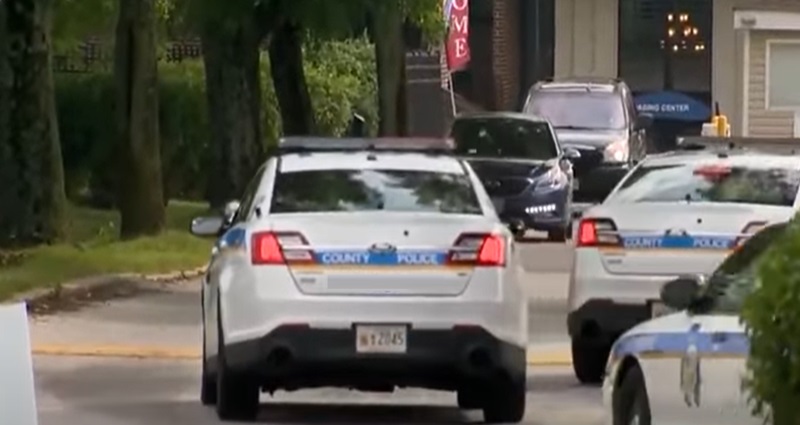
INDIANAPOLIS, October 29, 2023 –In a friend-of-the-court brief filed with the Maryland Supreme Court, the National Police Association argued that qualified immunity, applied properly, should be granted to a Maryland police officer who used deadly force against an armed suspect during a standoff that ensued from a routine warrant execution. The NPA contends that the Maryland Supreme Court should grant qualified immunity to Baltimore County police officer Royce Ruby for his actions during an August 2016 armed standoff with Korryn Gaines.
Officers were called to execute two arrest warrants at Korryn Gaines’s apartment in greater Baltimore, Maryland. On opening the door, officers found Ms. Gaines sitting in a hallway pointing a shotgun at the doorframe where the officers stood. Seeing the weapon, the officers retreated and took positions around the hallway outside. Backup, including Corporal Ruby, arrived after that. In short order, Ms. Gaines’s boyfriend and his daughter left the apartment. Ms. Gaines’s son Kodi stayed behind. A roughly six-hour standoff ensued.
Around 3:00 p.m., Ms. Gaines rose and went into the kitchen with Kodi, in view of Corporal Ruby but out of view of officers closer to the apartment entrance. Corporal Ruby, seeing also that Ms. Gaines had raised her shotgun, feared that Ms. Gaines had taken a tactical position in preparation for firing on the aforementioned officers. Purposefully aiming high to avoid the possibility of injuring Kodi, Corporal Ruby shot Ms. Gaines through her upper left side. The bullet ricocheted off the kitchen refrigerator and hit Kodi in the cheek. Ms. Gaines died after exchanging several more gunshots with the officers.
Ms. Gaines’s estate sued, alleging that Officer Ruby and others used excessive force, while a number of other claimants joined with derivative claims. Kodi’s representative filed one of these add-on claims, alleging in the appeal that Officer Ruby violated Kodi’s due process rights under the Fourteenth Amendment by injuring him, a bystander, during the shootout. In a Fourteenth Amendment substantive-due-process case, the all-important question is whether the officer’s conduct was “so egregious, so outrageous, that it may be fairly said to shock the contemporary conscience.” In the trial courts below, and the appeal preceding the present appeal, thecase had a number of unusual procedural complications which resulted in no court opining as to whether Corporal Ruby’s conduct shocked the conscience or not. Indeed, the Maryland Court of Appeals, in the ruling that Ms. Gaines’s estate appeals to the Maryland Supreme Court, held that Ms. Gaines’s estate could not pursue a Fourteenth Amendment claim against Corporal Ruby. As a second holding, the MCA concluded that even if Ms. Gaines’s estate could assert such a claim, Corporal Ruby was entitled to qualified immunity.
The NPA supported this secondary holding with its brief. The NPA argued first that the Estate’s position misapprehended the so-called “clearly established law” prong of qualified immunity. When assessing whether qualified immunity applies, a court must decide whether an officer (1) violated the United States Constitution by committing an act that a court had previously declared violated the Constitution; or (2) violated the Constitution by acting in a manner that so obviously risked violating the Constitution that a court need not have already declared it did so. A long-standing principle is that for acts closer to the gray area (sub point 1 in the previous sentence), the court must define the law at a low level of generality. In other words, a previous declaration that, generally, excessive force violates the Fourth Amendment is not sufficient to put an officer on notice that their particular conduct violated the Fourth Amendment. Instead, a court must have previously found that the officer’s acts, or those close to it, violated the Fourth Amendment.
According to Ms. Gaines’s estate, because it was “clearly established” that shooting a bystander during a use-of-force encounter “shocked the conscience,” it was thus clearly established that Corporal Ruby’s accidental, indirect shooting of Kodi shocked the conscience. The NPA argued in its brief that this is a misapplication of the law. It has never been established that accidentally injuring a bystander when using deadly force against a different, armed suspect who had just acted to threaten the lives of officers and others in close proximity—while purposefully working to avoid any harm to the same innocent bystander—shocks the conscience. To the contrary, past situations of a similar nature typically labeled such conduct as, at the most, negligent, but certainly not violative of the Constitution. Given this, the NPA argued, the Maryland Court of Appeals was precisely correct in finding Corporal Ruby entitled to qualified immunity.
The second argument in the NPA’s brief concerned the policy reasons supporting qualified immunity’s continued existence. It is no secret that the doctrine is under repeated, direct attack by the legal academy. It is likewise no secret that the doctrine is imperfect and occasionally applied by courts in a manner that does improperly extinguish meritorious civil rights claims. For these instances, the NPA acknowledges the doctrine is in need of repair and supports common-sense reform. But more often, the doctrine serves valid, important public policy. On a near-daily basis, the nation’s law enforcement officers must resolve situations involving belligerent individuals who may be under the influence of intoxicants, in the throes of a mental health crisis, armed with a weapon, or some combination of all three. The difficulty—and danger—these interactions pose can scarcely be put into words. As a result, constitutional doctrines that defer to officers in such situations, like qualified immunity, are preferable to the near-strict constitutional-liability scheme that some in opposition propose.
The National Police Association is represented by Robert S. Lafferrandre and Jeffrey C. Hendrickson of Pierce Couch Hendrickson Baysinger & Green, L.L.P., in Oklahoma City, Oklahoma. The case is Cunningham v. Baltimore County et al., No. SCM-REG-0009-2023, before the Maryland Supreme Court. The NPA’s brief can be accessed here
NationalPolice.org is a 501(c)3 nonprofit with a mission of educating supporters of law enforcement on how to help police departments accomplish their goals.
###